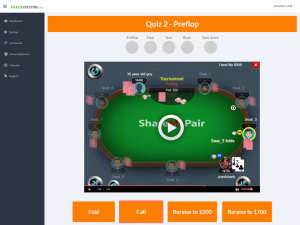







A Bit Too Optimistic?by Jonathan Little | Published: Aug 15, '16 |
 The following hand took place in the €5000 six-handed turbo event, which always takes place on the last day of European Poker Tour series to give the players one last chance at a nice score.
The following hand took place in the €5000 six-handed turbo event, which always takes place on the last day of European Poker Tour series to give the players one last chance at a nice score.
With blinds at 200/400 with a 50 ante, I raised to 1,000 out of my 50,000 stack with Qd-Jd from the cutoff seat. Deep stacked 6-handed NLHE is fun! The Small Blind, a young European kid, and the Big Blind, a tight player, called. I thought my opponents’ ranges could easily be incredibly wide, although they were probably not too out of line.
The flop came Kc-Tc-4c, giving me a weak open-ended straight draw. My opponents checked to me. It is somewhat likely that one of my opponents has either a pair or a draw that they would not fold to a flop continuation bet. Since I have a bit of equity if I improve to either a pair or a straight, I do not want to face a check-raise that would force me to fold. So, I decided to check.
The turn was the (Kc-Tc-4c)-Qs, giving me a pair. My opponents again checked to me. At this point, I think I have the best hand a decent amount of the time. I do not want to allow a club or Jack to come on the river that could easily give one of my opponents the best hand. I decided to bet 1,500 into the 3,450 pot. Looking back, I think a slightly larger bet of 2,000 would have been better because it would induce my opponents to fold their junky draws that have a lot of equity against me, such as 9s-7c. Only the Small Blind called my 1,500 bet.
The river was the (Kc-Tc-4c-Qs)-6c, putting four clubs on the board. To my surprise, the Small Blind bet 3,500 into the 6,450 pot. While this would normally be a trivial fold because I lose to any flush and any pair better than my middle pair, it is important to think about how my range appears to my opponent. When I checked behind on the flop, my opponent should assume that I do not have the Ace of clubs. If I do not have the nuts, that drastically decreases the number of hands I can call with on the river. I made the assumption that my opponent would bet with the Ace of clubs on the turn once the flop checked through. I was not sure if he would value bet lead with the Queen or Jack of clubs on the river. You will find that most players will not value bet with marginal flushes in this spot because they will typically only get called when they are beat. Of course, my opponent could be turning a hand better than mine, such as Kd-9d, into a bluff. The idea that neither of us has the nut flush made me think that my opponent should be bluffing more often than normal, hoping to put me in a tough spot with a weak flush or a one-pair hand.
Given my pot odds, which dictate that I need to have the best hand 26% of the time to justify calling, I decided to call. While I am unsure exactly how often I have the best hand, I am sure I will win more than 26% of the time against a European kid. Luckily for me, my opponent turned over Js-Ts for a bluff, awarding me a nice pot.
 If you enjoyed this type of hand range analysis, you will love my new interactive poker training site, PokerCoaching.com. Each month I post lots of new hand quizzes, assign an in-depth home work question, and host a live webinar where I review all the homework questions and give my answer. If you want to take your poker game to the next level, sign up at PokerCoaching.com.
If you enjoyed this type of hand range analysis, you will love my new interactive poker training site, PokerCoaching.com. Each month I post lots of new hand quizzes, assign an in-depth home work question, and host a live webinar where I review all the homework questions and give my answer. If you want to take your poker game to the next level, sign up at PokerCoaching.com.